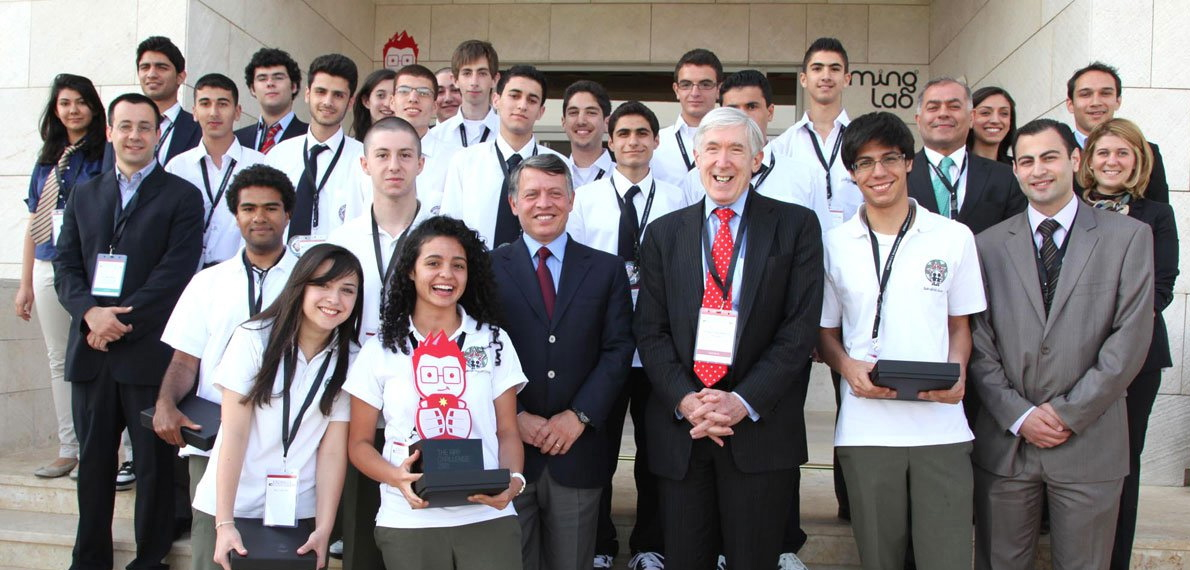I recently returned from Jordan, where I led the American delegation to the inaugural U.S.-Jordan Business Forum. The Forum was a resounding success. Over 150 American and Jordanian business and government leaders participated in a clear sign of the close strategic and economic partnership between our two countries. Eleven separate deals were announced, which will bring over $1 billion of investment to Jordan and benefit both the Jordanian and American economies.
A critical aspect of the success of the Forum was the way that King Abdullah II personally involved the young people of Jordan in this exciting event. For instance, I had the privilege to join the King in an award ceremony for a competition sponsored by the Royal Court in which Jordanian high school students designed applications for mobile devices to aid tourists during their stay in Jordan. Participating students — aged between 15 and 17 — worked in groups of five to learn the latest in app design development and design their own fully-functioning apps. As the final four teams presented their work to the King — and to the audience of American and Jordanian business and government leaders — we were all deeply impressed by the innovativeness and quality of their work. These students are as talented as any in the world today. Their optimism, capabilities, and creativity are a sign of the bright future that lies ahead if countries throughout the region can similarly encourage and provide science, technology, and mathematical training and other educational and entrepreneurial opportunities for their young people.
I also had opportunity to join in a discussion with a group of young Jordanian entrepreneurs who are working across a range of industries to build their ideas into sustainable, job-creating businesses. One of the entrepreneurs we met with, Dr. Usama Fayyad, has created a company called Oasis 500, which aims to fund 500 ideas for new businesses by 2015, by fostering increased investment, creating an Angel Investor network, and providing mentorship and training to young entrepreneurs. Dr. Fayyad, who has worked and studied extensively in the United States, represents the type of cross-border collaboration that fosters innovation and competitiveness in today’s global economy. American business leaders, innovators, and entrepreneurs, are similarly increasingly benefiting by greater collaboration with talented young entrepreneurs in countries like Jordan.

During the last several months, I have had the opportunity to travel to the Middle East three separate times — visiting Jordan, Egypt, Saudi Arabia, and the United Arab Emirates — to consult with government leaders, the private sector, and civil society groups on ways that the United States can work with them to spur growth, trade, and investment in the region to support the “Arab Spring.” At each of these stops, I have been deeply impressed by the many young people I have met. The youth of the Middle East and North Africa are as talented as entrepreneurial as the youth in any other region. That is why President Obama in his recent address on the Middle East placed so much emphasis on providing opportunities for young people. As the President said, “The greatest untapped resource in the Middle East and North Africa is the talent of its people.” This point was further reaffirmed at the G-8 Summit in Deauville, where the G-8 leaders pledged to foster more inclusive growth through increased trade, investment, and dialogue with the region — and especially engaging the region’s many young people.
We at the State Department are committed to this goal, which is why we are placing significant emphasis on our Global Entrepreneurship Program, which aims to foster greater opportunities for entrepreneurship and cross-border collaboration. Through this and other programs, we can utilize American strengths, such as our innovative spirit and entrepreneurialism and creativity. We seek to assist our business leaders, investors, and innovators to partner with those in the region seeking to more fully utilize their own creativity, innovative spirit, and entrepreneurial skills. In doing so, we are engaging with those who will shape the future of their countries, the region, and the world. Together with them we can pioneer cutting-edge technologies, scientific breakthroughs, and new patterns of cooperation that will lead not only to economic growth but also to technical and scientific advances that benefit all our peoples.
Ultimately, an improving economic situation in the Middle East and North Africa — and most importantly growth and private sector job creation that includes greater numbers of people, especially young people and women — will be a key to enhancing stability and democratic reform throughout this critical region. This outcome is of vital national and economic interest to the United States, to our partners in the region, and to the international community.
By: Robet Hormats
Source: Huffington Post / PDF
